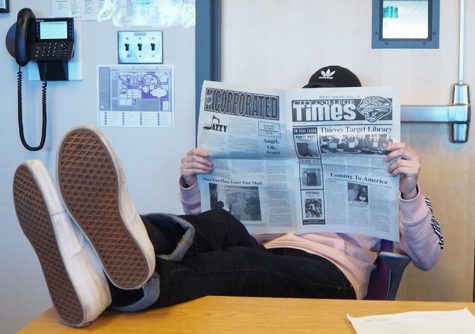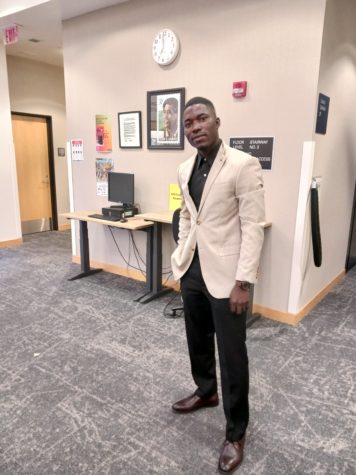SJCC journalism program keeps campus community informed
Photo courtesy of Farideh Dada / Times Adviser
Archive photo: San Jose City College Times staff hold the publication banner in the newsroom December 2012.
December 25, 2020
Were you the type of kid that was always jotting things down in a journal or diary? A curious observer of the world around you?
If that sounds like you, then you should consider an associate degree for transfer in journalism at San José City College.
It’s sure to be a formative experience that will guarantee your path to a bachelor’s degree and launch your career as a professional journalist. At a time when the world desperately needs trustworthy news, it will prepare you to make an impact.
Here is what to expect when you major in journalism, and why you should choose one of the best journalism programs in the Bay Area.
The American Press Institute defines journalism as the product of the activity of gathering, assessing, creating and presenting news and information. And of course, news should be based on evidence and proof.
Journalism includes traditional forms such as broadcast television, magazines and newspapers. It also includes radio and other types of audio. Increasing numbers of people get their news on social media, which is a drastic change that began only a few decades ago.
Over the past few years especially, the news has been radically digitized. Print is still hanging on for the few of us who love the feel of a real magazine or newspaper. But now 89% of Americans consume their news online.
So you might say that modern journalism is digital journalism. There are lots of upsides to this shake up such as speed, a wider reach and opportunities for new voices.
Some folks think the pros outweigh the cons, and they are pessimistic about the future of the entire field of journalism.
The sad truth is that people distrust internet news more than ever, and they are not off base. With the rise of social media and the easy sharing of low-quality content, it is normal to feel skeptical about what you’re reading on a daily basis.
In fact, if you’re not carefully selecting your sources, then it’s actually irresponsible if you don’t question your news. The more optimistic folks aren’t giving up on news altogether. They’re calling for media literacy in schools and more quality journalism.
We are firmly on the side of the optimists. We agree that the United States needs more journalists with solid education and experience. But a profound need is not the only appeal for an aspiring journalism major.
The API’s definition of journalism also includes the following: “History reveals that the more democratic a society, the more news and information it tends to have.”
Most of us are well aware that freedom of press is essential for freedom and democracy.
In an article from the World Economic Forum, experts stressed the urgency for quality journalism as we are confronted by uncertain times.
“As we move forward, independent professional journalism will be more important than ever in helping people understand the major challenges and opportunities facing us, from day-to-day local events to global issues.”
No matter what your politics are journalism is critical for everyone in every free nation.
Traditional publications are drastically altering their business models to remain profitable, and lots of them are making it work. Those who haven’t have made room for savvy digital publications.
According to Pew Research, employment in digital newsrooms increased 82% from 2008 to 2018. Business Wire, Inc., reported that the digital publishing industry is expected to grow by nearly $70 billion in the next four years.
Another less obvious source for modern news comes from the podcast industry, which is in a boom. Google’s personalized audio news, which launched in 2019, is expected to become a major news source.
All of this bodes very well for aspiring journalists. There is still a huge market and lots of journalism degree career opportunities.
SJCC’s Journalism Program is a catalyst for success.
The journalism community at SJCC is one of the most vibrant and respected in the Bay Area. Its programs are supportive yet challenging. More importantly, they give students unique opportunities to unleash their journalistic brilliance.
Journalism and broadcasting students at SJCC learn in a rigorous classroom setting; and since journalism is so interdisciplinary, students do not just study writing. They can explore photography, editing, advertising, designing, marketing, graphic art and social media, whatever interests them.
They have the opportunity to work on an award-winning publication, The City College Times, and on-air radio station KJCC.
The faculty, staff and students are wholeheartedly passionate about the news.
“Journalists exercise power. They are a voice for the voiceless. We produce journalists who fulfill the media’s role as a watchdog, an imperative to a free society,” said faculty adviser Farideh Dada.
In addition to its strong moral compass, the program has been recognized for its merit and achievements.
“We have a successful program, one that has been part of the community for more than 60 years and has consistently ranked among the state’s best in contests against other two-year colleges,” Dada said.
The ssociate’s degree in journalism at SJCC is a great option for students who would like to transfer to a four-year university. In fact, it’s actually an Associate Degree for Transfer.
Through the Degree with a Guarantee program, SJCC has agreements with the California State University system. College transfer students can qualify for guaranteed admission to a select number of CSUs.
The City College Times has received countless awards from a variety of organizations. In November 2020 alone, journalism students received 15 awards from the Journalism Association of Community Colleges.
It provides SJCC students with a remarkable opportunity. A space to collaborate, work and grow. Students get experience in communication, writing, reporting and navigating digital media. They have the opportunity to find their voice.
The campus publication upholds the highest standards for journalism and professionalism so that students can cultivate these essential skills before graduation. It is an experience that puts them ahead of the curve wherever they go.
Former editor of the City College Times Brennon Dixson spoke fondly of his time there. “The ability to jump right into the action and shape your own destiny,” made Dixson’s experience at the paper unique.
“It sounds super corny but SJCC’s paper is perfect for those who know they want to be a journalist because there’s plenty of opportunities to report, edit or design,” Dixson said.
Mark Sheppard, another former editor said, “I was able to develop a management style that I thought was conducive to collaboration, but I also got to have a real impact on the creative vision of the publication. That experience, I carry forward.”
Dixson transferred to CSULB and has gone on to become an award-winning education journalist. Sheppard is now an editor at The Chicago Policy Review.
“I just needed somebody to take a chance on me; The City College Times did and I have been reaping the benefits ever since,” Dixson said.
Working at the school’s publication puts journalism students light-years ahead of many of their peers once they transfer. It boosts their confidence and makes them more competitive if they want to go to top journalism schools.
The Journalism program at SJCC doesn’t just cater to future journalists.
“Not every student in the program goes on to a career in journalism, but every student in the program benefits from the training in at least these three ways: They learn the value of ethics — not just in the profession but in life. They improve their ability to write and otherwise communicate, and they will be a better consumer of news in today’s world,” Dada said.
She also emphasized equity in this sentiment.
“We promote social justice by giving equal opportunities to all. No academic prerequisites. No experience needed.”
So no matter who you are, a journalism degree or even just a few courses with the department will change how you think.
A journalism degree will set you on a path to success.
“We don’t just create future journalists, we inspire the uninspired. We show students a path forward, a way to reach their goals. Young people find their dreams in our program,” Dada said.
If you are dedicated to truth-telling and you want to make a difference, or if you’re interested in a career in the media, consider the journalism programs at SJCC.
This article originally appeared in The Roar.

















